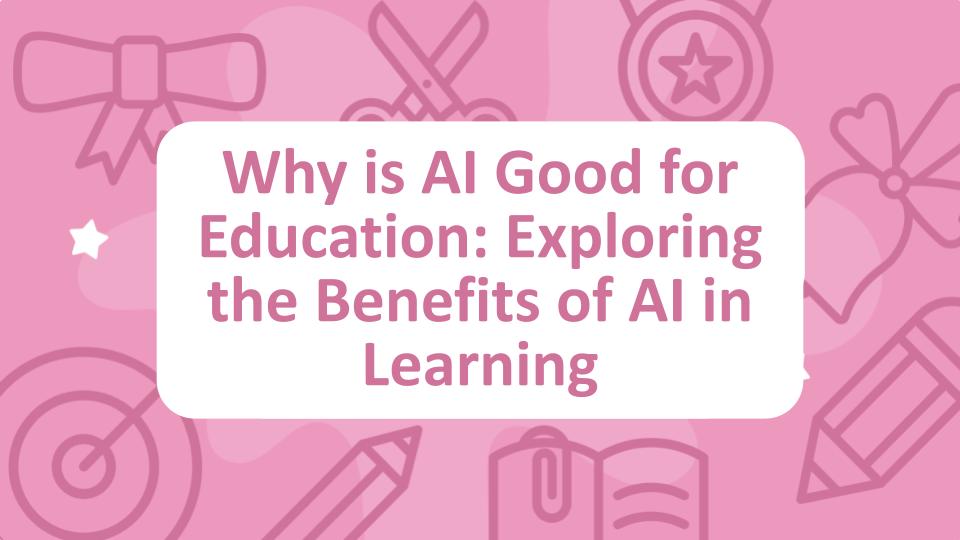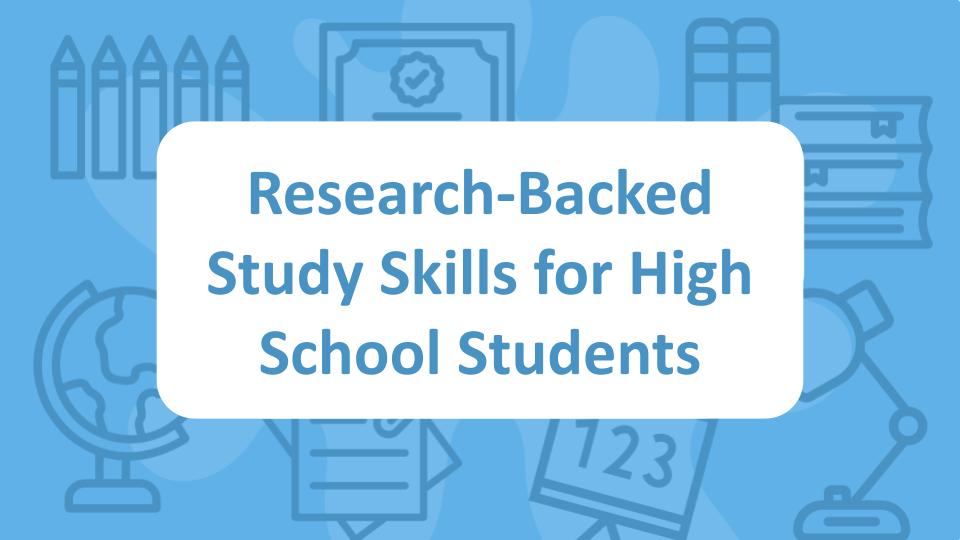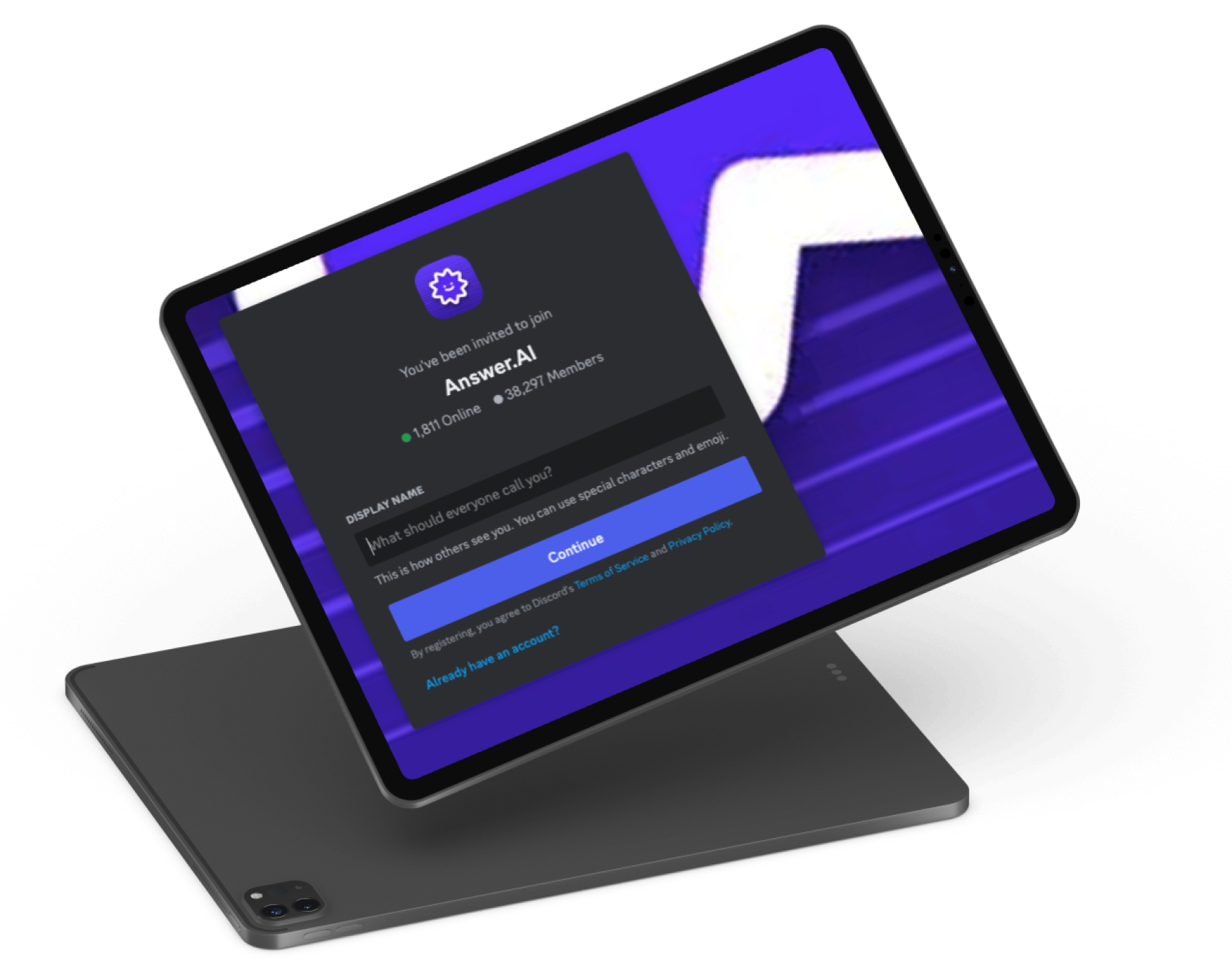Why is AI Good for Education: Exploring the Benefits of AI in Learning

Table of contents
Artificial intelligence (AI) has been silently transforming the educational space for years, and it's about to take center stage. From personalized learning experiences to efficient administrative tools, AI offers multiple benefits for students, teachers, and educational institutions alike. But why is AI good for education?
By leveraging AI, educators and students can access tools that enhance learning and streamline processes, making education more accessible, adaptive, and effective. In this article, we’ll explore the advantages of AI in education, covering topics like:
- Why AI is beneficial for students
- Why AI is good for teachers
- How AI enhances learning environments
- AI tools in education
How do we know about AI's impact on education? At Answer.AI, we're at the forefront of harnessing the power of AI to help students succeed. With millions of students in our community, we provide AI-powered tools and counseling to help students develop both academically and professionally. We are here so you can ask anything, and learn everything. Download Answer.AI on the App Store,Google Play Store, or Chrome Web Store. You can also check out our blogs and events for more free resources.
The Role of AI in Modern Education
The presence of AI in education is not about replacing teachers but augmenting the learning experience and supporting teachers in making learning more engaging and accessible. By offering innovative tools and insights, AI supports educators and makes learning more engaging, personalized, and accessible for students. From AI-driven tutoring to efficient grading systems, AI assists in addressing diverse student needs, creating customized experiences that would be challenging to achieve otherwise, including:
- Enhancing student support with AI-driven tutoring systems
- Tailoring learning experiences through personalized AI platforms
- Increasing administrative efficiency and reducing teacher workloads
AI-Driven Tutoring Systems
AI tutoring platforms, like Answer.AI’s 24/7 Math Tutoring, provide students with instant support in challenging subjects, enabling them to learn independently outside of regular class hours.hese systems adapt to individual learning styles, helping students grasp difficult concepts through practice and explanation. Beyond math, AI tutoring spans various subjects, promoting independent learning and reinforcing concepts covered in class.
Personalized Learning Platforms
Personalized learning is one of AI's most significant contributions to education. By analyzing student data, including performance, pace, and preferences, AI can adjust difficulty levels, recommend learning activities, and customize lessons. These personalized learning platforms allow students to progress at their own pace, helping those who may need extra time to master concepts and accelerating learning for those ready to move ahead. This approach fosters a supportive environment, ensuring that each student receives the resources and attention they need.
Increasing Administrative Efficiency
AI simplifies tasks such as grading, managing schedules, and tracking student progress. By automating these processes, educational institutions free up valuable teacher time, allowing educators to prioritize meaningful classroom interactions and student mentorship. For example, automated grading systems can evaluate multiple-choice and short-answer responses quickly and accurately, offering feedback almost instantaneously. This efficiency enhances the educational experience by allowing teachers to focus on the human aspects of teaching.
Why AI is Beneficial for Students
One of the most transformative aspects of student AI is its ability to create personalized learning paths that cater to each student’s strengths and weaknesses. This capability can help with:
- Personalized learning paths
- Instant feedback and continuous learning
- Support for diverse learning styles
Personalized Learning Paths
AI-driven tools analyze each student's abilities, learning preferences, and areas that need improvement, creating a customized approach that traditional classrooms often struggle to offer. Personalized learning paths mean that students get support precisely where they need it most.
- Improved Engagement: When lessons align with a student’s skill level and interests, they feel more connected to the material. This sense of alignment keeps students interested and motivated.
- Higher Retention Rates: Tailored lessons designed around individual learning styles and paces promote better understanding and retention, making it easier for students to remember and apply what they learn.
- Increased Confidence: Progressing at a personalized pace allows students to build confidence. With AI, they can revisit challenging topics or speed ahead where they excel, making learning less stressful and more encouraging.
For those looking to manage multiple AP courses or advanced topics, check out How to Excel While Taking Multiple AP Courses for more tips.
Instant Feedback and Continuous Learning
In traditional classrooms, feedback on assignments can take days or even weeks, which delays students' ability to learn from their mistakes. AI tools, however, provide real-time feedback, helping students make immediate improvements and better understand challenging concepts as they go.
- Real-Time Assistance: AI platforms like Answer.AI offer on-the-spot help for subjects like math, science, and even language arts. When students encounter a challenging problem, they can receive guidance instantly, eliminating frustration and waiting for help.
- Continuous Learning: AI provides additional exercises and practice problems tailored to each student’s needs, encouraging a continuous cycle of practice, feedback, and improvement. This allows students to revisit and master concepts over time, solidifying their knowledge.
For more on study efficiency, check out 4 Tips for Success When Studying for Exams to build effective study habits.
Support for Diverse Learning Styles
Each student learns differently, and traditional classrooms sometimes struggle to accommodate various learning preferences. AI tools offer adaptable methods to support diverse learning styles, from visual to auditory to kinesthetic, enhancing the overall learning experience.
- Visual Learners: AI can create infographics, charts, and other visual aids that help students better understand complex topics through visual representation.
- Auditory Learners: Many AI tools offer narrated lessons, audio feedback, and video explanations, providing auditory learners with the resources they need to thrive.
- Kinesthetic Learners: Interactive platforms, such as coding simulators or math problem-solving exercises, provide kinesthetic learners with hands-on activities, helping them grasp concepts through direct interaction.
For those looking to find the right study rhythm, explore How to Find Your Study Rhythm for guidance on building effective study routines.
AI also supports self-paced learning environments, where students can navigate through materials at a speed that feels comfortable to them. This benefit is particularly helpful for students who may feel pressured or left behind in traditional settings via:
- Reduced Pressure: In a self-paced setting, students can focus on truly understanding the material instead of rushing to keep up with a fixed curriculum.
- Encouragement to Explore: Students who finish early or who want to delve deeper can explore additional topics, fostering a love of learning that goes beyond just meeting classroom requirements.
- Progress Tracking: AI tools track student progress and milestones, providing positive reinforcement and motivation as they reach goals, no matter how big or small.
Preparing Students for Future Careers
Learning with AI tools not only enhances academic performance but also prepares students for a future where AI technology will be prevalent in most career fields. By familiarizing students with AI tools, we set them up to thrive in a tech-driven world.
- Career-Ready Skills: Using AI in education helps students gain valuable experience with digital tools and data interpretation, skills that are increasingly in demand.
- Enhanced Critical Thinking: AI-based learning often involves problem-solving exercises that encourage students to think critically, a skill set vital for both college and career success.
Why is AI Good for Teachers?
AI tools are not only beneficial for students but also provide significant advantages for educators by automating time-consuming tasks and allowing them to focus more on teaching and interaction.
Automated Administrative Tasks
AI tools in education offer significant advantages for educators by automating time-consuming tasks, providing valuable insights, and supporting personalized teaching approaches. By handling administrative duties and enhancing lesson planning, AI frees teachers to focus on what they do best: engaging with students and fostering a dynamic learning environment.
- Automated administrative tasks
- Enhanced lesson planning
- Supporting professional development
- Improving parent-teacher communication
Automated Administrative Tasks
Administrative tasks—such as grading, attendance tracking, and performance monitoring—often take up hours of a teacher’s day. AI helps streamline these processes by automating repetitive tasks, allowing teachers to dedicate more time to meaningful student interactions and personalized teaching.
- Automated Grading: AI systems can grade multiple-choice tests and, with advancements in natural language processing, can even assess some types of written responses, including short-answer and simple essay questions.
- Efficient Attendance Management: AI-powered attendance systems can automatically track student presence in class, even generating detailed attendance reports that simplify record-keeping and provide quick insights on student attendance patterns.
- Student Performance Tracking: AI tools gather data on student performance and analyze it to highlight trends, allowing teachers to identify students who may need extra support. These insights enable timely intervention for struggling students and facilitate differentiated instruction based on individual needs.
For additional ways to streamline the classroom, explore AI Tools for Student Success.
Enhanced Lesson Planning
AI can significantly enhance the lesson planning process by providing data-driven insights that allow teachers to tailor lessons according to students’ evolving needs and comprehension levels. By analyzing data on individual and class-wide performance, AI helps teachers identify which topics require more attention and adapt their lessons accordingly.
AI-Powered Lesson Planning Benefits:
- Targeted Content: AI-generated reports on student performance help teachers create lessons that address specific areas where students may struggle, making instruction more effective and goal-oriented.
- Improved Engagement: By adapting lessons based on real-time performance data, teachers can ensure their content remains relevant and engaging for students, maintaining student interest and promoting deeper learning.
- Enhanced Resource Access: Many AI tools recommend supplemental materials and resources—like videos, articles, or interactive exercises—that align with the lesson plan, supporting teachers with resources tailored to their objectives.
- Curriculum Adjustments: AI can highlight gaps in understanding across a classroom, suggesting shifts in curriculum pacing or structure. This flexibility supports teachers in responding dynamically to students' needs rather than following a rigid curriculum.
Supporting Professional Development
AI offers teachers valuable insights into trends in student performance, learning barriers, and teaching strategies, providing a data-driven basis for refining their instructional approach. Through these insights, teachers gain a deeper understanding of what teaching methods work best, enabling continuous professional growth.
- Identifying Trends and Barriers: AI analyzes patterns in student performance, helping teachers pinpoint common challenges. This data can reveal if particular teaching strategies need adjusting or if certain topics consistently challenge students.
- Personalized Professional Development: AI-based platforms can recommend professional development resources based on identified gaps in student performance, allowing teachers to access targeted support to improve specific skills.
- Real-Time Feedback on Teaching Effectiveness: As AI tracks and assesses student engagement and comprehension, it provides feedback on how well particular lessons resonate. Teachers can use this information to adjust their methods, fine-tuning their approach based on real-time data.
Improving Parent-Teacher Communication
AI tools can also enhance communication with parents by generating detailed reports on student progress. These insights make it easier for teachers to provide updates on student achievements and areas for improvement, helping parents stay informed and involved in their child's education. With digital reports accessible via online portals, parents can stay updated on their child’s progress, attendance, and achievements, promoting a more collaborative relationship between home and school.
How AI Enhances the Learning Environment
AI fosters a more inclusive and adaptable learning environment, creating opportunities for all students to thrive. From accessibility tools for students with disabilities to collaboration-enhancing features and support for remote learning, AI bridges gaps and builds connections within educational settings. These advancements empower students, teachers, and parents to navigate diverse learning needs and preferences seamlessly.
Accessibility for Students with Disabilities
AI technology enables inclusive learning experiences by providing resources tailored for students with disabilities, such as:
- Speech-to-Text Tools: For students with writing or motor difficulties, AI-driven speech-to-text technology allows them to participate more fully by transcribing spoken words into written text. This tool can be essential for completing assignments, taking notes, or expressing ideas without the physical demands of typing or writing.
- Text-to-Speech and Audiobooks: AI-powered text-to-speech tools provide essential support for visually impaired students or those with reading challenges by converting written content into spoken words. This accessibility feature helps students process information aurally, enabling a richer understanding of course material.
- Real-Time Captioning: For students with hearing impairments, real-time captioning tools (like Google’s Live Transcribe) deliver on-the-spot transcription, allowing them to follow lessons, lectures, or discussions in real-time. This feature is particularly valuable in classrooms with multimedia resources, making all spoken content accessible.
- Customizable Learning Interfaces: Many AI tools allow adjustments to font size, contrast, and color schemes, catering to students with visual impairments or learning disabilities that affect visual processing.
Fostering Collaboration
AI can facilitate group learning by creating virtual study spaces and assigning tasks based on individual strengths, encouraging students to collaborate effectively.
Ways AI Enhances Collaboration:
- Online Study Groups: AI-driven platforms allow students to form study groups based on subject, grade level, or interest, creating a sense of community and encouraging collaborative study. Virtual study spaces enable group discussions and support peer learning, regardless of location.
- Personalized Roles: By analyzing students’ skills and strengths, AI can assign specific roles within group projects to maximize each member’s contribution. This approach helps students build confidence in their abilities, fosters interdependence, and ensures that tasks are distributed effectively.
- Instant Sharing: AI-powered collaboration platforms enable students to share notes, quizzes, resources, and multimedia content instantly. This seamless exchange of information promotes active learning and keeps group members engaged and informed.
For insights on studying in groups, see Benefits of Studying in Groups.
Supporting Remote and Hybrid Learning
As remote and hybrid learning models become more common, AI tools are bridging the gap between traditional classrooms and virtual environments. By offering resources and interactive features that engage students from afar, AI helps create a cohesive learning experience, regardless of physical location.
Benefits of AI in Remote Learning:
- Access to Digital Resources: AI-powered educational platforms make it easy for students to access lessons, study materials, quizzes, and other resources online. This accessibility ensures that students have the tools they need to succeed, whether they’re learning from home, school, or on the go.
- Flexibility: AI platforms allow students to review lectures, revisit lessons, and practice concepts at their own pace. This flexibility is especially beneficial for students who may need extra time to master complex topics or for those who wish to advance more quickly through familiar content.
- Engaging Interactive Content: AI enhances online learning by incorporating interactive elements like quizzes, virtual simulations, and gamified activities. These tools make remote learning more engaging and interactive, helping students stay focused and motivated even outside a traditional classroom setting.
For students looking to optimize remote study sessions, explore Studying Distraction-Free: Set Yourself Up for Success for more tips.
Answer.AI Proves Why AI Is Good for Education
By leveraging AI’s ability to adapt and respond to individual learning patterns, Answer.AI helps students learn more effectively, manage their study schedules, and stay motivated. This student-focused approach promotes independent learning, resilience, and confidence—qualities that benefit students academically and beyond. Some of our features include:
- Math Tutor: Master math effortlessly with Answer.AI's upgraded Math Camera mode. Simply scan a problem, and get accurate, step-by-step explanations tailored to your learning style.
- College Admissions Advisor: AI college counseling features, as well as resources on how to approach college fairs and college interviews.
- Scholarship Advisor: By analyzing your unique profile, our AI delivers personalized scholarship recommendations tailored just for you.
- Flashcard Generator: With Answer.AI, just snap a photo of your textbook, and instantly get a set of custom flashcards tailored to your study needs. I
- Study Groups: Make homework more fun and productive with Answer.AI Study Groups! Join up to three friends and voice chat alongside your personal AI tutor. Work together on tough problems while getting real-time help from AI.
- AP Exam Prep: Practice with engaging multiple-choice questions across subjects like English, History, and Social Science, designed to test your knowledge and boost your confidence.
Answer.AI is dedicated to supporting students with AI-driven study tools, personalized resources, and 24/7 assistance, ensuring that every student has the tools they need to succeed. By leveraging AI, we’re building an educational landscape where each student’s learning needs are met, providing them with opportunities to thrive academically and beyond.
By downloading Answer.AI on the App Store, Google Play Store, or Chrome Web Store you can experience the power of AI in education today! You can also check out our blogs and events for more free resources.
See Related Articles

Research-Backed Study Skills for High School Students

Back-to-School: Preparing for a Successful Year

Benefits Of Studying In Groups

Join our Discord community
Get updates on upcoming webinars, live discussions, peer support, and more.
Join the community




